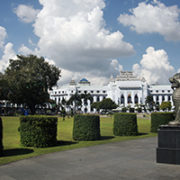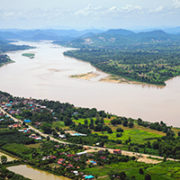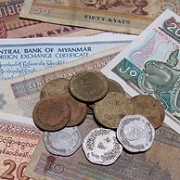Tag Archives | Myanmar
Governance and public sector management
 Agriculture and natural resources, Infrastructure, Regional cooperation and integration
Agriculture and natural resources, Infrastructure, Regional cooperation and integration
 Finance sector development, Information and Communications Technology
Finance sector development, Information and Communications Technology
 Economics
Economics
 Finance sector development
Finance sector development
 Governance and public sector management
Governance and public sector management

Stepping up civil service reforms in Myanmar

The coronavirus disease (COVID-19) has highlighted the importance of the civil service but has also, ironically, hindered its reform activities. Civil service personnel will have to work with government leaders to find the right balance between addressing public health and economic concerns and implementing policies for mitigating the effects of the pandemic. It is crucial that the civil service is equipped with the capacity and mindset to address this crisis.
Perspectives on Mekong-Japan cooperation for inclusive growth and mutual benefits

Rapid economic development in recent decades has transformed Southeast Asia and prepared the region to join international production networks, which allow greater exports of manufacturing products, textiles, and other primary high-quality valued added products to the international market. This economic development has been achieved thanks to investments from around the globe into the region as a result of a favorable labor force, connectivity and innovation growth, and regional political stability as driven by the Association of Southeast Asian Nations (ASEAN) vision.
Blockchain pilots making waves in developing Asia

We’ve all heard the buzz about the potential applications of blockchain technology. But what’s actually happening in developing countries in Asia and the Pacific? Beyond bitcoin payments and remittances, blockchain exists largely in the pilot stage. Governments and banks are collaborating with technology firms to see if it can be used to solve persistent problems like traceability, identification, and trust.
PRC’s slowdown for Asia’s growth – key takeaways

After many decades of driving regional growth, the economy of the People’s Republic of China (PRC) is now slowing down, and this is likely going to have a noticeable effect on the world economy and especially globally integrated economies in developing Asia.
Myanmar has much to learn from Viet Nam’s exchange rate reforms

Myanmar’s exchange rate reform is a fundamental change, but it is not unique. A striking parallel can be found in Viet Nam’s move in the late 1980s to unify its multiple exchange rates into a single rate and its corresponding announcement of exchange rate management through a managed float, just as Myanmar is doing now. The experience of Viet Nam in reforming its exchange rate system—both good and bad—offers valuable lessons for Myanmar. The aim of this piece is to try to draw out some of these lessons. The objective is not to recommend that Myanmar should uncritically follow the lessons from the Viet Nam experience, but that the country should adopt these lessons to its own circumstances.
Myanmar: Rushing in Where Angels Have Feared to Tread

The remarkable, surprising, and extensive reformist policies of the new Republic of the Union of Myanmar have sparked interest throughout the international community. As one of the world’s last bastions of both relative isolation and new opportunities, Myanmar has recently become a magnet to which many are drawn. Governments, international non-profit organizations, and businesses are exploring what they might do in a state marred by intense poverty but possessing abundant natural resources. With a literate and diverse population and a myriad of business opportunities, Myanmar entices with many diverse possibilities for rapid growth and social equity. Hotels are filling up with tourists who now feel more comfortable going to that once exotic land, and embassies may well expand staffs to handle more foreign assistance. Many more international NGOs will join the fifty or so already there, and those that are well established may increase staffs as needs become more visible and access increases.


Search
Subscribe / Connect to Asia Pathways
Subjects
- Agriculture and natural resources
- Blog
- Capacity development
- Climate change
- Economics
- Education
- Energy
- Environment
- Finance sector development
- Gender
- Governance and public sector management
- Health
- Industry and trade
- Information and Communications Technology
- Infrastructure
- Miscellaneous
- Population
- Poverty
- Private sector development
- Regional cooperation and integration
- Sanitation
- Social development and protection
- Transport
- Uncategorized
- Urban development
- Video Blog
- Water
Recent Posts
- Unraveling the Health Risks of Climate Change
- Linking Farmers to Markets Through Agricultural Cooperatives and E-Commerce in Asia
- How Can Governments Support Electricity Distribution to Achieve Net Zero in Asia?
- Promoting Corporate Climate Action Through Greenhouse Gas Accounting
- Evaluating G7 Commitments on Climate Change, Health, Well-Being, and Agriculture




Recent Comments